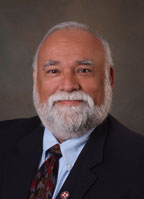New Year Brings New Rules for OAP
By Luis Muñoz, Theatre Director | Monday, August 22, 2011 2:40 PM

Luis Muñoz, Theatre Director
Another summer has come and gone. I hope all of you had a good rest and are ready to tackle the new year. The summer months have been a busy time at the UIL office. There have been many meetings, conversations and deadlines to meet. We are well aware of the Mayan prediction of a 2012 apocalypse. In some ways, 2012 will bring on changes that will end the One–Act Play Contest as we know it. It is extremely important that you be prepared to follow all the new rules.
You will need to order a copy of the Handbook for One-Act Play 19th edition. Make sure you review it carefully as the changes are significant. I want to thank the students from Barbara Jordan High School in Houston for providing the cover art.
The Legislative Council voted to limit the number of clinics that a school can attend during a school year. Each school is limited to four sessions each school year. A session is defined as a two-hour block during which the play is performed and the school receives a critique from a critic or a team of critics. Only three sessions can be scheduled during the school week. Additionally, because state law limits the number of extracurricular activities to one per week, you can only schedule one session during any one week. The fourth session can be scheduled on a holiday or weekend. You also are free to schedule all for sessions on weekends or holidays.
Time Warnings
There are several changes to the timing rules in the contest. Beginning this spring, rules require that audible time signals be given during setup and strike. The company will receive audible warnings from an official timekeeper beginning at the time they have five minutes left. They will receive notifications every minute until one minute is left. The company also shall receive an audible warning that the 60 seconds to begin the play has begun. If the contest manager or other contest official is making announcements between the plays, the company shall be informed that the announcements have concluded and that they have one minute to begin their performance.
The company shall also receive an official warning when 35 minutes have elapsed. This procedure will be determined at the planning meeting. These procedures also shall be reviewed at the official rehearsal and the directors meeting. The contest managers at the area and regional levels shall determine the procedures and review them with the company at the official rehearsal and with the directors at the Directors' Meeting.
Panel Judging
Last year the Legislative Council passed an amendment to the Constitution requiring that critiques be allowed when the panel judges used. Panel judging will be used at the region and state level beginning in 2012. Panel judging procedures can be found in the 19th edition of the Handbook. In addition to receiving an oral critique from one of the panelists, schools also will receive written evaluations from all three panelists. A copy of the evaluation form can be found in the Handbook.
Districts who wish to use panel judging at their contests will be allowed to select one of the three judges between Aug. 15 and Nov. 1, 2011. The other two judges shall be contacted after Nov. 1. This was done so that the judging pool would not be depleted before all the districts had a chance to acquire a single critic judge. The first judge selected will select the acting awards at the contest.
Pending Council Approval
The music rule will be amended to comply with federal interpretations regarding fair usage of music. The total amount of music allowed will continue to be 10 minutes. When a work is under copyright, only 30 seconds may be used from that piece of music. Those 30 seconds may be looped or used at various times during the performance. Music, which is in the public domain or original work by students and staff, is not limited by this restriction. If passed, this amendment will go into effect immediately.
Pending approval of the Legislative Council, an alternate may be used at the contest site in one of the following three situations:
- As an audience member under the supervision of an employee of the school district.
- As a dressing room assistant under the supervision of the school's directors.
- As a site crewmember under the supervision of the contest manager.
An alternate shall not be allowed to participate in, strike or run the contest entry.
If passed, this amendment will go into effect immediately.
Pending approval by the Legislative Council, we will no longer time internal scene changes. The scene changes have become very difficult to time with any accuracy because of changes in technology and in dramatic structure. The scene changes or transitions will, however, count towards the 40-minute total. If passed, this amendment will go into effect August 2012.
Handbook Clarifications
1. At least two stopwatches are needed to time every time element. The lowest time shall be used as the official time.
2. Soft goods used on door frames and window units do not count towards the total soft goods allotment.
3. Ramps standing on end, platforms with 1" x 2" railing, parallel platforms and flats shall not be used to elevate units set elements when actors are staged on them.







